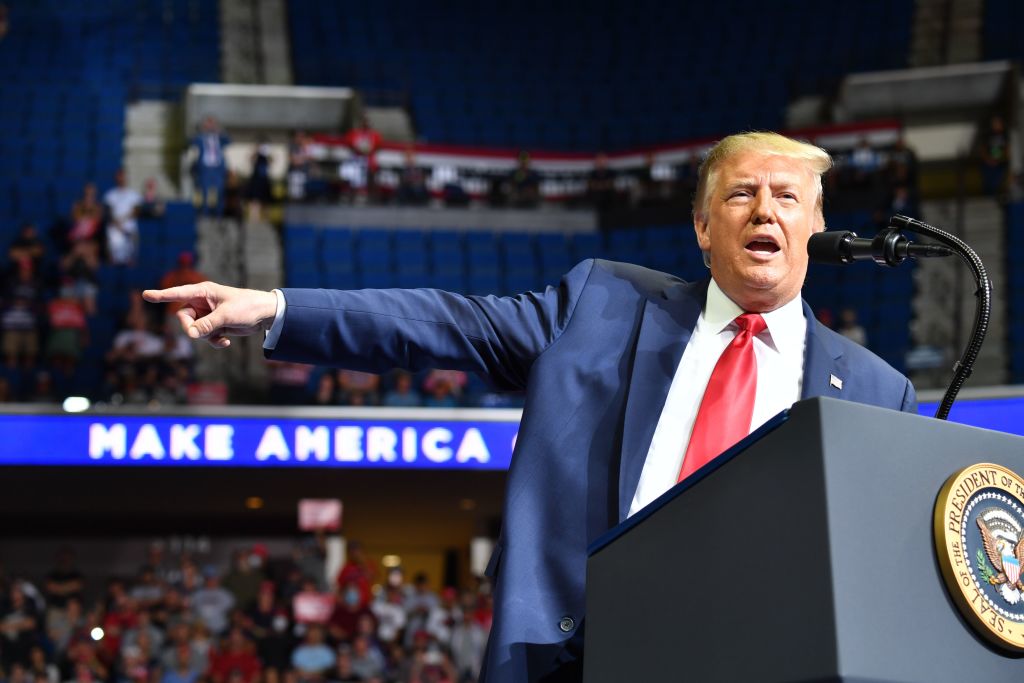4 reasons Trump's big comeback rally in Tulsa was two-thirds empty


A free daily email with the biggest news stories of the day – and the best features from TheWeek.com
You are now subscribed
Your newsletter sign-up was successful
President Trump, publicly fixated on crowd sizes, looked out "in horror" at "the endless rows of empty blue seats" before taking the stage Saturday night at Tulsa's Bank of Oklahoma Center, The New York Times reports. Fewer than 6,200 ticket holders had showed up at the 19,000-seat arena, according to Tulsa's fire marshal.
"Trump's mood had improved" by the end of the rally, the Times reports, but he arrived back at the White House "with a defeated expression on his face, holding a crumpled red campaign hat in one hand. Exactly what went wrong was still being dissected on Sunday." Here are four factors that likely played a role:
1. Overselling: Trump, campaign manager Brad Parscale, and allies bragged for days that more than a million people had reserved tickets for the rally.
The Week
Escape your echo chamber. Get the facts behind the news, plus analysis from multiple perspectives.

Sign up for The Week's Free Newsletters
From our morning news briefing to a weekly Good News Newsletter, get the best of The Week delivered directly to your inbox.
From our morning news briefing to a weekly Good News Newsletter, get the best of The Week delivered directly to your inbox.
"You never, ever brag about ticket reservations," writes HuffPost's Yashar Ali, explaining he ran big rallies in his "previous life in politics." You're "embarrassed if people don't show up," but "it also discourages attendance."
2. "TikTok Teens and K-Pop Stans": That's how the Times summarizes a mostly underground campaign on TikTok and Twitter, fueled by fans of Korean pop music, to prank Trump by reserving plausibly hundreds of thousands of rally tickets. "K-pop Twitter and Alt TikTok have a good alliance where they spread information amongst each other very quickly," said YouTuber Elijah Daniel, 26.
3. Trump fans were scared: Parscale disavowed responsibility for the no-shows, claiming "the fake news media warning people away from the rally because of COVID and protesters, coupled with recent images of American cities on fire, had a real impact." The only mainstream media outlet regularly showing footage of burning buildings is Fox News, and some people did leave before Trump arrived because "they did not want to be in the city after dark," The Washington Post's David Weigel reported. White House officials also speculated that real coronavirus concerns kept many older Trump fans away. Parscale and allies claimed protesters blocked the stadium entrance, though "reporters present said there were few protests," the Times notes.
4. Oklahoma is red but small: Given COVID-19 headwinds, Trump's campaign shouldn't have picked a state with just over a million registered Republicans, Ali argues. Parscale should have held Trump's comeback rally in Florida (4.8 million registered Republicans) or Texas (more than 6 million).
A free daily email with the biggest news stories of the day – and the best features from TheWeek.com
Peter has worked as a news and culture writer and editor at The Week since the site's launch in 2008. He covers politics, world affairs, religion and cultural currents. His journalism career began as a copy editor at a financial newswire and has included editorial positions at The New York Times Magazine, Facts on File, and Oregon State University.
-
 Why is the Trump administration talking about ‘Western civilization’?
Why is the Trump administration talking about ‘Western civilization’?Talking Points Rubio says Europe, US bonded by religion and ancestry
-
 Quentin Deranque: a student’s death energizes the French far right
Quentin Deranque: a student’s death energizes the French far rightIN THE SPOTLIGHT Reactions to the violent killing of an ultraconservative activist offer a glimpse at the culture wars roiling France ahead of next year’s elections
-
 Secured vs. unsecured loans: how do they differ and which is better?
Secured vs. unsecured loans: how do they differ and which is better?the explainer They are distinguished by the level of risk and the inclusion of collateral
-
 Labor secretary’s husband barred amid assault probe
Labor secretary’s husband barred amid assault probeSpeed Read Shawn DeRemer, the husband of Labor Secretary Lori Chavez-DeRemer, has been accused of sexual assault
-
 Trump touts pledges at 1st Board of Peace meeting
Trump touts pledges at 1st Board of Peace meetingSpeed Read At the inaugural meeting, the president announced nine countries have agreed to pledge a combined $7 billion for a Gaza relief package
-
 NIH director Bhattacharya tapped as acting CDC head
NIH director Bhattacharya tapped as acting CDC headSpeed Read Jay Bhattacharya, a critic of the CDC’s Covid-19 response, will now lead the Centers for Disease Control and Prevention
-
 Witkoff and Kushner tackle Ukraine, Iran in Geneva
Witkoff and Kushner tackle Ukraine, Iran in GenevaSpeed Read Steve Witkoff and Jared Kushner held negotiations aimed at securing a nuclear deal with Iran and an end to Russia’s war in Ukraine
-
 Pentagon spokesperson forced out as DHS’s resigns
Pentagon spokesperson forced out as DHS’s resignsSpeed Read Senior military adviser Col. David Butler was fired by Pete Hegseth and Homeland Security spokesperson Tricia McLaughlin is resigning
-
 Judge orders Washington slavery exhibit restored
Judge orders Washington slavery exhibit restoredSpeed Read The Trump administration took down displays about slavery at the President’s House Site in Philadelphia
-
 Hyatt chair joins growing list of Epstein files losers
Hyatt chair joins growing list of Epstein files losersSpeed Read Thomas Pritzker stepped down as executive chair of the Hyatt Hotels Corporation over his ties with Jeffrey Epstein and Ghislaine Maxwell
-
 Judge blocks Hegseth from punishing Kelly over video
Judge blocks Hegseth from punishing Kelly over videoSpeed Read Defense Secretary Pete Hegseth pushed for the senator to be demoted over a video in which he reminds military officials they should refuse illegal orders
